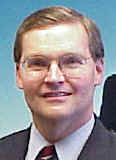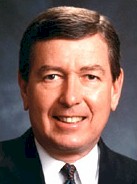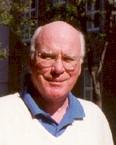| News from October 1-5, 2002 |
 Ferguson (at right) said that "To help prevent and
contain the effects of a regional event, financial utilities and critical firms
should regionally diversify their back offices and operational sites that
support clearing and settlement for critical markets. In particular, primary
operations and backup operations need to be significantly more diverse in order
to meet the greater regional risks. The old model of having primary and backup
operations centers in close proximity so that they can be served by a common
labor pool does not address the possibility of a significant threat to an entire
region and labor pool."
Ferguson (at right) said that "To help prevent and
contain the effects of a regional event, financial utilities and critical firms
should regionally diversify their back offices and operational sites that
support clearing and settlement for critical markets. In particular, primary
operations and backup operations need to be significantly more diverse in order
to meet the greater regional risks. The old model of having primary and backup
operations centers in close proximity so that they can be served by a common
labor pool does not address the possibility of a significant threat to an entire
region and labor pool."
 Rep. Boucher (at
right) summed up the problem that the bill addresses. He said that "The
Fair Use doctrine is threatened today as never before. Historically, the nation’s
copyright laws have reflected a carefully calibrated balance between the rights
of copyright owners and the rights of the users of copyrighted material as
reflected in the Fair Use doctrine. The Digital Millennium Copyright Act of 1998
(DMCA) dramatically tilted the copyright balance toward complete copyright
protection. The 1998 law enables the copyright owner to enshroud his material
with a technological protection measure and then makes it a civil wrong and a
potential federal felony for anyone to circumvent the technical measure for any
purpose. Even people who have purchased and paid for copyrighted material would
be liable if they bypass the technical protection for the purpose of making Fair
Use of the work they have lawfully acquired."
Rep. Boucher (at
right) summed up the problem that the bill addresses. He said that "The
Fair Use doctrine is threatened today as never before. Historically, the nation’s
copyright laws have reflected a carefully calibrated balance between the rights
of copyright owners and the rights of the users of copyrighted material as
reflected in the Fair Use doctrine. The Digital Millennium Copyright Act of 1998
(DMCA) dramatically tilted the copyright balance toward complete copyright
protection. The 1998 law enables the copyright owner to enshroud his material
with a technological protection measure and then makes it a civil wrong and a
potential federal felony for anyone to circumvent the technical measure for any
purpose. Even people who have purchased and paid for copyrighted material would
be liable if they bypass the technical protection for the purpose of making Fair
Use of the work they have lawfully acquired."
 Rep. Boucher has long been active on IPR, tech and telecom issues.
Rep. Doolittle (at right), in contrast, has not heretofore been a leader in
these areas. He is a conservative Republican who was first elected to Congress
in 1990. He now sits on the Appropriations
Committee. His 4th District lies to the West of Sacramento. While it
includes much of the Sierra Nevada range, including Yosemite National Park, it
is also home to the facilities and employees of some tech companies located in
the Sacramento area. Two of the leading employers in his district are Hewlett Packard and Intel.
Rep. Boucher has long been active on IPR, tech and telecom issues.
Rep. Doolittle (at right), in contrast, has not heretofore been a leader in
these areas. He is a conservative Republican who was first elected to Congress
in 1990. He now sits on the Appropriations
Committee. His 4th District lies to the West of Sacramento. While it
includes much of the Sierra Nevada range, including Yosemite National Park, it
is also home to the facilities and employees of some tech companies located in
the Sacramento area. Two of the leading employers in his district are Hewlett Packard and Intel.
 Ashcroft (at right) said that
"In June, the House of Representatives responded by passing -- by an
overwhelming majority -- a statute that the Department crafted carefully to
address the Supreme Court's concerns while strengthening our ability to protect
children from abuse and exploitation. I applaud Congress for working with the
Department to pass swiftly this critical legislation. I call upon the Senate to
recognize the threat to the health and safety of our children, and to act with
similar urgency and see that this legislation becomes law."
Ashcroft (at right) said that
"In June, the House of Representatives responded by passing -- by an
overwhelming majority -- a statute that the Department crafted carefully to
address the Supreme Court's concerns while strengthening our ability to protect
children from abuse and exploitation. I applaud Congress for working with the
Department to pass swiftly this critical legislation. I call upon the Senate to
recognize the threat to the health and safety of our children, and to act with
similar urgency and see that this legislation becomes law."
 Sen. Leahy continued that "The
Court's decisions in the Florida Prepaid trilogy have been the
subject of bipartisan criticism. Charles Fried, a former Solicitor General
during the Reagan Administration, has called these decisions ``truly
bizarre.´´ Senator Specter has remarked that they ``leave us with an absurd
and untenable state of affairs,´´ where ``States will enjoy an enormous
advantage over their private sector competitors.´´ I could not agree more. I
also agree with the four dissenting justices that these decisions constitute an
egregious example of judicial activism and a misapplication of the Constitution.
In their rush to impose their natural law notions of sovereignty as a barrier to
democratic regulation, the activist majority cast aside the text of the
Constitution, ripped up precedent, and treated Congress with less respect than
that due to an administrative agency."
Sen. Leahy continued that "The
Court's decisions in the Florida Prepaid trilogy have been the
subject of bipartisan criticism. Charles Fried, a former Solicitor General
during the Reagan Administration, has called these decisions ``truly
bizarre.´´ Senator Specter has remarked that they ``leave us with an absurd
and untenable state of affairs,´´ where ``States will enjoy an enormous
advantage over their private sector competitors.´´ I could not agree more. I
also agree with the four dissenting justices that these decisions constitute an
egregious example of judicial activism and a misapplication of the Constitution.
In their rush to impose their natural law notions of sovereignty as a barrier to
democratic regulation, the activist majority cast aside the text of the
Constitution, ripped up precedent, and treated Congress with less respect than
that due to an administrative agency."
 Zoellick (at right) also spoke about the broader
benefits of free trade. He said that "Free trade agreements can help
establish the basic building blocks for sustainable development, including
private property rights, competition, the rule of law, societal gains from the
transmission of ideas and technology, sectoral reforms, and regional
integration. Most importantly, free trade is about freedom and open societies.
These values are at the heart of America's larger reform and development agenda.
The U.S. free trade agenda can help fragile democracies in Central America and
Southern Africa, and other developing nations, just as U.S. trade policy after
World War II helped secure democracy and hope in Western Europe and Japan. From
Johannesburg to San Salvador, America is opening a new pathway to promote
prosperity, the rule of law, and liberty."
Zoellick (at right) also spoke about the broader
benefits of free trade. He said that "Free trade agreements can help
establish the basic building blocks for sustainable development, including
private property rights, competition, the rule of law, societal gains from the
transmission of ideas and technology, sectoral reforms, and regional
integration. Most importantly, free trade is about freedom and open societies.
These values are at the heart of America's larger reform and development agenda.
The U.S. free trade agenda can help fragile democracies in Central America and
Southern Africa, and other developing nations, just as U.S. trade policy after
World War II helped secure democracy and hope in Western Europe and Japan. From
Johannesburg to San Salvador, America is opening a new pathway to promote
prosperity, the rule of law, and liberty."